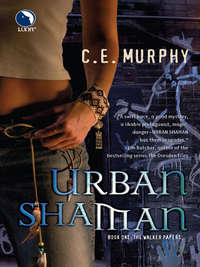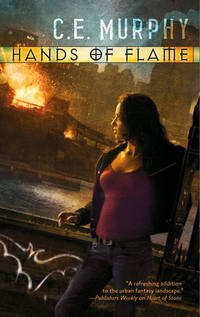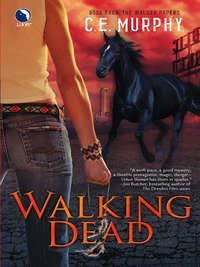
Полная версия
Heart of Stone
Warmth flushed through Margrit, a blush of color that had no business belonging to the idea of being followed. Keeping a dangerous habit was bad enough. Not-so-vicarious thrills at having her own stalker was considerably worse.
Though still, even with the peculiar fingerprints, even with the impossibility of Alban’s leap, what remained was the confidence of his hands on her hips, and the curiosity in his eyes as they’d spoken.
Margrit stifled another groan, this time of impatience at herself, and wrenched her attention back to the young woman asking for her help.
She was pretty in a mournful way, with brown eyes so dark they seemed to have no boundary between iris and pupil. Her cheeks were hollow and the knees of her jeans were pale with wear and age. The hems were ratty and the sneakers had seen better days. She was a picture of betrayed innocence, a good witness, Margrit thought clinically, and dropped her chin in a nod. “What’s your name?”
“Cara. Cara Delaney. Thank you. Thank you for listening.”
Margrit shook her head. “I haven’t done anything yet. You’re not twenty-one, are you?”
“No.”
“So much for a shot to warm you up. It’s fine. Let’s get back to my office, though. It’s warmer there and it’s just around the block.” She touched the girl’s shoulder, encouraging her into motion. “You understand this kind of thing doesn’t just happen overnight?” she asked as they walked. “It takes permits and notices and hearings to tear down buildings, even old ones.”
“There weren’t any. I swear, Ms. Knight—” “I believe that you haven’t seen any. It’s just that it may be a place to start an injunction against the squatters being thrown out.” Margrit glanced at her. “Squatters, right?”
Cara nodded. Margrit followed suit, studying her again. The right clothes would make her the perfect witness: nothing too good, but clearly the best a homeless girl could afford. With her fragile loveliness and large eyes, and a helpless baby on her hip, she’d be a poster child for the poor displaced by the whims of the wealthy. “How old’s your daughter?”
“Three months. Her name’s Deirdre.” The name was gently drawn out, much the way Cara had said her own name.
“That’s pretty. So’s she.”
Cara smiled. “Thank you. It means sorrowful.”
Margrit blinked. “Why would you give her a sad name?”
“My people think a name should do many things. Reflect your circumstances, maybe give you something to stand up for, or fight against.”
Margrit’s eyebrows shot up. “Your people?”
Cara’s cheeks darkened in a flush and she fixed her gaze on her feet. “The Irish,” she said after a few seconds. Margrit pulled her eyebrows back down where they belonged and smiled.
“I don’t think I’ve ever heard anybody say it quite that way before. Are you from Ireland? You don’t sound like it.”
“I was born there.” “Are you—”
“My father was an American citizen,” Cara interrupted. “I’m not illegal, if that’s what you’re thinking.”
Margrit exhaled, slowing as she nodded at the Legal Aid Society building. “My office is in here. I’m glad you’re legal. That makes things less complicated.” The guard at the door straightened as Margrit led Cara up the steps and smiled at him. “Evening, Mark.”
“Thought you were out celebrating, Ms. Knight.”
“Margrit!” she reminded him for the hundredth time. He was well over six feet tall, and thick-shouldered as a wall, relying on intimidation rather than an inclination to hurt people to get his job done. He’d worked there longer than Margrit had and still refused to call her by her first name. “This is Cara. She’s with me.”
“Miss.” Mark ducked his head politely as he unkeyed the security alarm and unlocked the door. “Call down when you’re leaving, Ms. Knight, so I can turn off the alarm.”
“We will,” Margrit promised. “Thanks, Mark. Come on, Cara. I can at least make a pot of coffee while we talk.”
The security guard keyed the pad again as Margrit and the selkie girl disappeared into the lobby. Alban walked to the other side of the street, casting quick glances at the building as he ducked his head over a cup of coffee that was more for show than to quench thirst. A light came on in an office on the second floor and he let out a sigh that steamed in the chilly air. The guard watched him, caution in his eyes. Alban inclined his head and picked up his pace, letting his feet take him around the corner and out of sight.
Habit made him check the street even as he gathered himself. There were always stragglers in the city, drunks or homeless or late businessmen who might catch a glimpse of him if he allowed himself to become careless. A few times he’d been noticed, springing upward as he did now, a blur of strength and power hesitating on window ledges only long enough to pounce to the next. Fortunately, drunks and homeless were rarely considered reliable, and businessmen wouldn’t risk their reputations with stories of creatures scaling building walls in a single bound.
The ledge he found suited him, close enough to the street to watch easily, but far enough up that he would go unnoticed. Even if someone did see him, they would only be surprised, and uncertain if they’d ever noticed the stonework on the building before. There were risks, and then there were the constants of human nature.
Alban crouched, three points on the ledge and his right elbow draped over his knee. Wings settled around his shoulders, falling like a heavy cloak, and he waited, still as stone, for Margrit or the dawn.
SEVEN
THE LIGHT CLICKED off, sudden darkness across the street briefly incomprehensible. Alban blinked without understanding, then pushed back, hands on his knees as he straightened his spine. Bells from a nearby church had rung the first small hour of the morning long enough ago that he’d begun to think dawn would make an entrance before Margrit Knight took her leave from work, even if wintertime bought him more hours than a summer night would. Sunrise might come late, but he still preferred to be safely ensconced in his home well before it broke. Perching on building ledges during daylight hours made discovery far more likely.
The patient security guard, whose rounds had kept him within Alban’s line of sight all night, pressed a code into the numerical safety box on the building’s side, and a moment later held the door for a tired-looking Margrit. She gave him a weary smile, pulling her coat around herself more tightly against wind coming up from the water. It carried her words and a quiet laugh as she shook her head: “I’ve already called one, but I wouldn’t mind company until it gets here. Thanks, Mark. Did Cara get out safely?”
“Paid for her cab,” Mark replied. “She didn’t want me to, but it’s bad, walking around with a baby that late.”
Margrit flashed a smile and turned her gaze up to the skyline. Hope and fear swept Alban, an unexpected combination of emotion that left a chill behind. For a moment her eyes lighted on him, then went on without recognition or notice. Of course, he thought, though disappointment replaced hope.
“Did you get a receipt?” Margrit asked. “Let me pay you back, anyway. I think Russell will assign somebody to the case, so I can get reimbursed.” She dug into her purse as Mark shook his head.
“Don’t need to, Miss Knight. Didn’t do it just to get my money back. She needed a ride, that’s all.”
Margrit’s smile deepened. “You’re a good man, Mark. Thanks. I didn’t even think of it.” She tugged something out of her purse anyway, palm-size and oddly textured, silver over metallic red, then slid it in her pocket. Alban tipped his head, watching her actions, which were easy enough to be ritual, then brought his attention back to the conversation.
“Been a long day,” the security guard said. “You can’t remember everything.”
“Don’t tell me that.” Margrit walked down the steps, peering up the street for her taxi. “Next thing I know you’ll be telling me I can’t save the world.”
“Wouldn’t bet against you, Miss Knight.”
Margrit grinned over her shoulder at the guard, then looked back up at the sky. “That’s what I like to hear. Thanks.” Her smile faded to a frown. “Mark, was that there before?” She lifted a hand, pointing a gloved finger directly at Alban.
So much for humans never looking up. Stillness was a way of being—not flinching, not moving, requiring no more thought than breathing did. Alban’s heart thudded with the panic of discovery regardless, even as a part of him wanted to laugh at his own fears. His intention was to bring himself to Margrit’s notice. Being found out shouldn’t be alarming, especially when she couldn’t possibly recognize him.
The guard came down the stairs to follow her extended arm. “Musta been, Miss Knight. Don’t remember seeing it, though.”
Margrit dropped her hand slowly and nodded. “I swear I’ve looked out my window a million times at that building and never saw it before.”
“Funny what we notice,” Mark agreed. “Here’s your cab, Miss Knight.” He stepped past her as the vehicle pulled up, and opened the door for her. Margrit gave him a grateful smile and ducked into the car.
A grin, full of unusual wickedness, broke through Alban’s stony expression. He leaped upward, leaving his perch behind, and paused long enough on the rooftop to catch Mark’s bewildered expression when he looked up to find the statue on the ledge gone.
A matter of steps between the taxi and her apartment building’s front door was all the time he had. There’d be no room for prevarication, no chance to back out. He waited on a balcony a few stories up, not wanting the cab driver to catch sight of him and perhaps identify him. Trusting Margrit wouldn’t turn him in was enough of a gamble, though at least it would be difficult for her to catch him, if she was so inclined. The cab pulled away as she scurried up the steps to unlock the front door.
Alban dropped from the balcony, landing in a crouch on the sidewalk a few yards behind her, and pushed to his feet before murmuring, “Margrit.”
She twisted the lock open and stepped inside without looking back. Silver wire glinted at her ear, suddenly resolving: headphones attached to the palm-size metallic-red MP3 player that swung from her wrist. “Mar—!”
The door clicked shut. Alban stepped back with a gasp of disbelieving laughter. No light came on in the front of her apartment. He’d have no chance of catching her in the kitchen without breaking in. He stood staring up at the building, then spread his hands helplessly. “Margrit?”
There was no answer, nor had he expected one. Time held him in its slow grip, watching her window until even he began to feel cold settling onto his skin. Then he shook himself and took to rooftops and sky, returning home in befuddlement.
“You wanted to see me?” Margrit leaned into her boss’s office, trying to look wide-awake and perky. She was getting old. A few days of an upset sleep schedule wasn’t as easy to get by on as it’d been in college.
Russell glanced up and gestured her in. “Yes, come in, Margrit, please. Have a seat. I’ve been looking over the notes you took on last night’s petitioner.” He tapped the pile of paperwork she had left, information about Cara and data regarding building codes and wrecking protocols. Looking at it, Margrit felt a surge of satisfaction; squatters’ rights weren’t in her field of expertise, but she thought she’d put together a good preliminary package. “How late were you here?”
She dropped into one of the visitor’s chairs. “I don’t know. One or two. I sent Cara home earlier than that, but I wanted to get some information together for you to look at. It was almost eight when we got here,” she added to herself. Tony should have answered his phone at that hour. It wasn’t too late to call. Work may have caught him, but she wished he’d returned the call. Even a late night would have been nice to share after a triumphant day.
Margrit pulled her mind back to the topic at hand, shrugging. “I asked her everything I could think of and told her I’d try to get you to assign someone to help her. It’s—” “You.”
Margrit straightened in the chair, enough adrenaline washing through her to wake her up fully. “I appreciate the offer, sir, but I’m really not any sort of an expert on housing situations. I was thinking Nichole—”
“If you need her help, I’ll ask her to do what she can. I spent a while on the phone this morning.” He glanced at the clock, which read a little after ten.
Margrit shifted her shoulders guiltily. “I would’ve been in earlier, sir, but—” she cleared her throat and offered a lame smile along with the unvarnished truth “—but I was still sleeping.”
Russell smiled. “It’s all right. None of us were here bright and early. Maybe a little too much celebrating.” He shook his head. “I didn’t mean to reprimand you. You’ve done a fine job here the past few years. You’re exactly the sort of person we need in Legal Aid. Young, dedicated, enthusiastic.”
Pretty, Margrit thought. There were other words, too, that Russell avoided, as her boss and as a male. Descriptors that would be inappropriate to point out as being among her strengths as a lawyer. She nodded slightly, acknowledging his compliments without speaking.
“You make a good public face.” Russell leaned forward. “Which is part of why I want you on this case. As I was saying, I made some phone calls this morning. This building,” he said, nodding toward the stack of papers Margrit had left, “is owned by Eliseo Daisani.”
The air abruptly weighed heavier on Margrit’s shoulders. “The Eliseo Daisani?” As if there might be more than one, she teased herself, trying to deflate a spurt of panic that ballooned in her stomach. “Then it’s even more imperative, sir, that you have someone experienced in this field—”
“I want you. You’re high profile right now, Margrit, and that’ll only help us. This girl, this Cara, approached you directly. It’s a good story for the press.” He sat back, gesturing at her. “You’ll make a good face as an adversary against Daisani’s corporation. We need that, too. And it doesn’t hurt that—”
He broke off, waiting for her to finish his sentence for him. Margrit studied him silently, her gaze level. It took so little time for him to complete it that only someone who knew he expected the defendant to speak for herself would have heard the hesitation. “—you’re black.”
Margrit thinned her lips, then said coolly, “I’m also white and probably American Indian, Russell. Nobody’s going to be fooled by sending me into the Projects. I grew up in Flushing, for God’s sake. Dad’s a surgeon.” She propped her fingers in a steeple in front of her chest, a posture learned from her father. “Mother is a corporate finance manager. I’m not a Cinderella story.”
“Nor am I going to try to sell you as one. Nonetheless, it’s a card to play and I intend to use it to our benefit.”
“Sir.” Margrit could hear the anger in the clipped way she spoke the word. She folded her hands out of their steeple and found them re-forming it above her lap, her fingertips now pointed accusingly at her boss. “By putting me as lead counsel on this you’re trying to make people think, ‘Look, a black girl who’s done well. Now she’s giving back to the little people she came from. Good for her!’ You’re using me to lie by way of public perception.” A shred of guilt whipped through her as she remembered how she’d sized up Cara’s physical appearance as a potential benefit when she climbed on the witness stand. But Margrit pushed the memory away, meeting Russell’s gaze with her own forthright anger.
“Does that mean you’re refusing the case, Counselor?”
Goddammit. Margrit bit back the words, staring at him. “It means I’d like some time to think about it, sir.”
“I’ll expect a decision by this afternoon. Margrit,” he added, as she stood and stalked toward the door. She turned back, lips compressed. “Your name is already in the news right now. If Cara Delaney or anyone at her building mentions talking to you about this, you may find yourself on Eliseo Daisani’s radar. He’s a powerful man, and information has a way of making its way to the ears of the powerful. Think carefully, but think quickly. If there’s a compelling enough reason behind him wanting this building to come down, you may find yourself with a dangerous enemy.”
“Thank you, sir.” Margrit left his office with her fists clenched, and snatched up her coat on the way out of the building. There was no thinking about her destination; thought might send her in the other direction. She hailed a cab rather than give in to the desire to run her anger out. A dockworker might reasonably show up to an impromptu meeting sweaty and disheveled. A lawyer for Legal Aid couldn’t afford that as a first impression.
Particularly not with the target she had in mind.
Daisani’s personal assistant made heroin chic look like a healthy lifestyle choice. Everything about the woman was thin: her hair, scraped back against her skull into a bun so tight it looked as if it must give her a headache; her eyes, behind rectangle-framed tortoise-shell glasses; her nose, which was pinched enough that Margrit thought she must have a hard time breathing. She was excruciatingly well dressed, but the linen and silk of her suit somehow managed to play up the sharpness of her shoulders and the vicious angles of her collarbones. Margrit, in an ivory suit she’d rescued from the dry cleaners, felt unexpectedly lush in comparison.
“Do you have an appointment?”
Margrit startled, trying not to stare. She’d expected a voice as thin and nasal as the woman, a piercing soprano. Instead she spoke in a warm contralto with bright notes to it, like rich liqueur poured over ice. The tone was professional enough to border on unfriendly, but it couldn’t hide the depth of music in her voice. Margrit’s planned arguments to win an appointment with Daisani were abandoned in favor of a heartfelt, “You have a beautiful voice.”
The thin woman went still for a moment, then flickered a smile that did nothing to relax her features. “Thank you. Do you have an appointment?”
Impatience, Margrit told herself, would get her nowhere. They both knew she didn’t have an appointment, but form had to be met. She proffered a wry smile and shook her head. “I’m afraid not. I was hoping—”
“Mr. Daisani,” the narrow woman said, “is a very busy man.”
“I understand.” Margrit kept the rueful smile, and gestured to one of the lobby chairs. “I’d be glad to wait. I only need a few minutes of his time.”
The woman opened an appointment book of rich, embossed brown leather that complemented the pale wood of the enormous curved desk Eliseo Daisani’s personal assistant was barricaded behind. There was nothing in the office that wasn’t sumptuous. The lobby chairs were antiques, some covered in pale leather, others in rich red velvet that looked so soft Margrit had forced herself not to stop and brush her fingers across it as she entered. The hardwood floors gleamed as if they were polished every night, scuffs removed with prejudice. The walls were paneled wood, as polished as the floors, all of it harkening back to an era decades before Margrit’s own.
Paintings on the walls dated from the twenties, art deco at its finest, with the exception of one discreet portrait of a slim, dusky man behind the assistant’s desk. A woman bearing a striking resemblance to the assistant herself was also in the portrait, her hair cut in a sharp bob that did much more for her thin features than the tense bun this woman wore. Margrit dared a nod at the portrait, asking, “Your grandmother?”
As if she might be surprised by what lay there, the assistant turned to look at the painting. “Vanessa Gray,” she said. “And Dominic Daisani, Mr. Daisani’s father.” The second showing of interest in her, rather than Eliseo Daisani, seemed to thaw a very slender thread within the woman. A note of pride entered her rich voice as she turned back to Margrit. “I was named for her. My family has worked with Mr. Daisani’s family for a long time.” With the slight relaxation, she looked like the before picture of a makeover: there was beauty in her, tightly restrained. Margrit wondered what had made her decide to go the sourpuss route instead of playing up the glamour within.
“She was lovely. You look like her.” The compliments were honest, and Margrit offered another smile along with them, stepping back from the desk. “I really don’t mind waiting. Just a few minutes of his time, maybe?”
Vanessa Gray the younger pursed her thin lips and nodded very subtly toward a chair. Margrit took the victory, smiled again and retreated to await her chance.
“Miss Knight. What a pleasure to meet you.” Eliseo Daisani came around a marble desk that would fill Margrit’s bedroom, and offered her a hand, clasping hers in both of his when she took it. He was barely taller than she was, wiry in build, and his hands were disconcertingly hot.
“The pleasure is mine, Mr. Daisani.” Margrit spoke with a degree of reservation. “I appreciate you sharing a few minutes of your time.”
“When the rising star of the city’s Legal Aid Society comes knocking on my door, I am of course predisposed to discover her mission.” Daisani winked, making fun of himself. He was too thin for good looks, but his grin was disarming and he clearly knew it. Despite herself, Margrit smiled.
“I think you probably know why I’m here, Mr. Daisani.”
“Of course I do. It’s the price of being me. Someone has to be aware of all these details, and I was the best man for the job. Please, won’t you sit down?” He ushered her to a love seat coupled with a couch in front of floor-to-ceiling windows that overlooked the city. “Isn’t the view tremendous?” he asked, sounding as if he’d called it up especially for her. “Some days I don’t get any work done at all, just looking down at the city. Well, between that and the books.” He gestured easily at the far end of the office, which was walled to the ceiling with pale wooden shelves filled with hundreds of books, interspersed with decorative objects. “May I get you some water?”
“Yes, please. Do you mind?” She gestured toward the bookshelves in turn, taking a step or two in their direction. Daisani made a generous, expansive hand wave, inviting her to look as he went to a wet bar at the other end of the enormous office. “I don’t have that problem,” Margrit added as she approached the shelves. “My office is a cubicle in the middle of a building. Is that a Rodin?”
“It is.” Daisani sounded pleased as he joined her, offering a glass that gave a low, subtle ring of sound as Margrit took it. Crystal, she thought, trying not to look as startled as she felt. Of course it would be crystal. Nothing in Daisani’s office was of a halfway measure. “You have an excellent eye, Miss Knight.”
“I’ve never even seen photos of this before. It looks like an early sculpture of The Secret.” Margrit reached out to touch the marble hands, clasped together in silent eternity. “I didn’t know he’d done more than one version. I should be so lucky as to have knickknacks like yours, Mr. Daisani.” She turned her head, studying a pair of soft-looking furs pinned to the wall at the end of the shelves. One was much smaller than the other, and a thread of cool wariness slipped through Margrit. Daisani was a hunter, and apparently didn’t care if his prey was a mother with child. She turned her gaze back to him, keeping her expression neutral.
Daisani beamed at her. “An excellent eye,” he repeated. “I’ll be certain to arrange for a much better view.” Margrit blinked at him and his eyebrows—dark, inquisitive—rose. “In your new office.”
“My what?”
“Your new office.” Daisani’s eyebrows went higher, as if he was surprised it was necessary to explain. “As counsel for Daisani Incorporated, of course. You didn’t think I’d put you in a cubicle, did you? In this building?” He twirled a finger, making it clear the whole building was at his disposal.
“Counsel for what?” Margrit could feel heat building in her cheeks, a distressing indicator that she’d been outplayed and was too startled to react quickly. “I’m sorry, what?”








